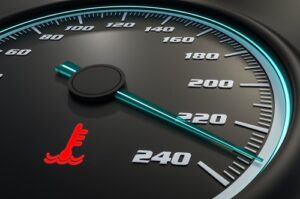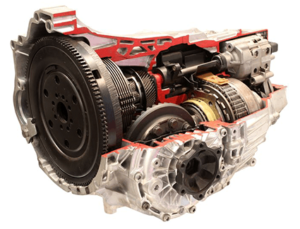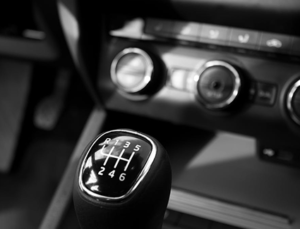Signs of a blown transmission
Never underestimate the importance of your transmission. It’s required to keep your car moving. It transfers the power of your engine to your wheels. But your transmission is much more complicated than that. So are the problems that can develop with it. This makes regular transmission service extremely important in order to keep you moving.
So, how do you know when your automatic transmission is about to fail you or already blown? These six signs of a bad transmission will help you determine if your transmission is toast.
Strange Noises
If you hear clunking, grinding, or whining sounds every time you shift gears, visit a mechanic for car repairs right away. These are all signs your transmission is going. This problem could be caused by a number of issues, ranging from insufficient transmission fluid to damaged or worn-down gears. Identifying the type of sound and at which point of the shifting process it happens will help your mechanic figure out the problem.
Strange Smells
It is time to start thinking about your next fluid change once you start to detect a light, burning odor. Transmission fluid will typically smell sweet or tart. Transmission fluid keeps all the transmission parts lubricated. It also prevents it from burning itself up. If your transmission fluid is burnt, your transmission could be burning, too. If that’s the case, you could need a complete transmission rebuild.
Shifting Issues
Difficulty shifting or a gear slips are clear signs of transmission problems. With a manual transmission, this is usually caused by a worn clutch. In automatic vehicles, low fluid levels, worn-down gears, broken transmission bands, or problems with the solenoid or torque converter, could cause it.
Slippage
Slippage is when your vehicle behaves like its on ice or snow, but you are on dry pavement. You push down on the car and you don’t go anywhere. Your motor is revving but your car isn’t responding. Slippage affects your transmission’s ability to propel the car forward. Ignoring this issue will lead to your car not moving at all.
Overheating
Around 90% of all automatic transmission failures are caused by overheating. While driving, the metal parts of your transmission system are in constant contact with each other. This causes friction that turns into excessive heat when there’s not enough fluid for lubrication. When the component overheats, it produces an unmistakably burnt smell and can lead to a blown transmission if you don’t refill the fluid immediately.
Extreme Heat from Inside Your Car
It is possible to feel your transmission overheating from the inside of your car. If you have a rear wheel drive car, you can feel the heat coming into the passenger compartment through the bottom of the car. This is because the transmission transfers power and heat along the length of the vehicle, to get the power to the rear wheels. If the transmission overheats in front wheel drive cars, you will probably feel this heat between the driver and passenger seats in the gearshift housing.

The Most Common Causes of Hard Shifting
We’ll go ahead and say this first: if you suspect that you’re having transmission-related problems, the best thing you can do is to take your vehicle to a mechanic as soon as possible—like most maintenance issues, if left unchecked, a transmission problem can ultimately cause more damage to the other engine components and end up costing a lot more unnecessarily.
The number one must common cause of hard shifting is a problem with the transmission fluid. Either not enough of it, or old, used-up transmission fluid needing to be replaced. Without enough fluid, the transmission won’t be lubricated. The same goes for old fluid. A lack of lubrication will almost always cause hard shifts, so have your transmission fluid checked by a professional. If you check it yourself, remember that it should be a transparent red color. Discolored, dark transmission fluid should be replaced.
In modern vehicles, another often-unsuspected but surprisingly common cause for hard shifting is a sensor malfunction. As you may know, cars and trucks made in recent years have a large number of sensors installed, each of which is responsible for doing things ranging from detecting temperatures in various parts of the engine to—you guessed it—telling the vehicle when it’s time to shift.
Oftentimes, the sensor responsible for hard shifting is the speed sensor, which monitors how fast or slow your vehicle is going. This information is necessary to tell the transmission when it’s time to shift, so if the sensor is reporting incorrect data, the times that your vehicle shifts will, at the very least, feel “off.” Eventually, this can lead to hard shifts. The good news is that a sensor adjustment or replacement is a substantially cheaper repair than anything to do with the transmission itself, though if left unchecked the hard shifts might lead to further damage. As with all things transmission it’s a good idea to have this problem resolved quickly.
Other causes of hard shifting are less common, but can still occur, such as clogged vacuum lines, transmission fluid leakage, faulty shifter cables, or a worn out clutch.

Transmission Problems to Never Ignore
There are no transmission issues to stress the average car owner. They are, at best, uncomfortable and, at worst, very expensive. Proper vehicle maintenance is the best way to prevent transmission problems, but realistically, if you have a vehicle for a long time, or if you buy an older vehicle, sooner or later your car will have transmission problems.
Transmission problems, if not fixed, will inevitably become worse, and there are some early indications that you should have a mechanic check out your vehicle. The following can be signs of a bad transmission:
Check Engine Light comes on:
Your Check Engine Light is the first indication that something has gone wrong, or is about to. It can mean any number of things, including transmission problems. There are sensors throughout your vehicle that tell the on-board computer if anything unusual is happening, and a number of those sensors are located on your transmission. They can pick up the tiniest vibration or jerk that you might not even feel. Never assume that your Check Engine light has come on for no reason.
Clunking, humming, or whining:
Sound transmission may be difficult to identify, but usually sounds like whining, humming, buzzing or clunking. If you hear something you haven’t heard before, it’s best to check it out.
Shaking or grinding:
Your car shouldn’t shake or jerk, and you shouldn’t hear grinding sounds. These are all indications of a transmission problem. With manual transmissions, the most common danger sign is grinding when you change gears. If that happens after you activate the clutch and shift gears, it could also be a sign the clutch is damaged. Either way, you need to check it out. With an automatic transmission, you will most likely have a hard time getting into gear the first time you take off. As it gets worse, you will see vibrations. Again, check it out.

Noise in neutral:
If you see a crash sound when your car is in neutral, the problem may be as simple as low or dirty transmission fluid. If refilling fluids doesn’t help, the fluid may be dirty, or there may be worn parts in the transmission – typically bearings, reverse idler gears, or gears.
Hesitating: If the car hesitates when shifting gears, there is usually a problem with the clutch. However, if you find that the vehicle’s shifting is not smooth, it could also be a sign of a transmission problem.
Low or leaking fluids: A transmission fluid leak is one of the most reliable signs of transmission problems, and should not be ignored. If you let it continue to leak, you could cause irreparable damage to your transmission. You can easily identify transmission fluid leaks. It’s bright red, and translucent, and it smells a little sweet if all else works. If the liquid looks dark or smells burnt, the mechanic can drain it and replace it with a new transmission fluid.
Burning smell:
Of course, if you smell something burning, you need to act immediately. Rule out the possibility of a fire, then consider other causes. One of the most common causes of a burning smell is an overheated car transmission fluid. This occurs when the fluid is damaged by debris and mud. Dirty fluids won’t keep your transmission parts cool and lubricated so they don’t get damaged, and if you leave your car running dirty, you’ll end up with a bad transmission.
Drag clutch: If you have a manual transmission, and the clutch seems to drag, that’s because the clutch disc and flywheel don’t release when you press the clutch pedal. The clutch is still turning, and changing gears will be difficult, if not impossible. You may find that this problem is accompanied by a grinding noise when you try to change gears.
Car won’t get into gear: This can also be a fluid problem, so check and make sure it’s at the right level. It can also be a problem with the clutch connection, shift cable, or the computer system.